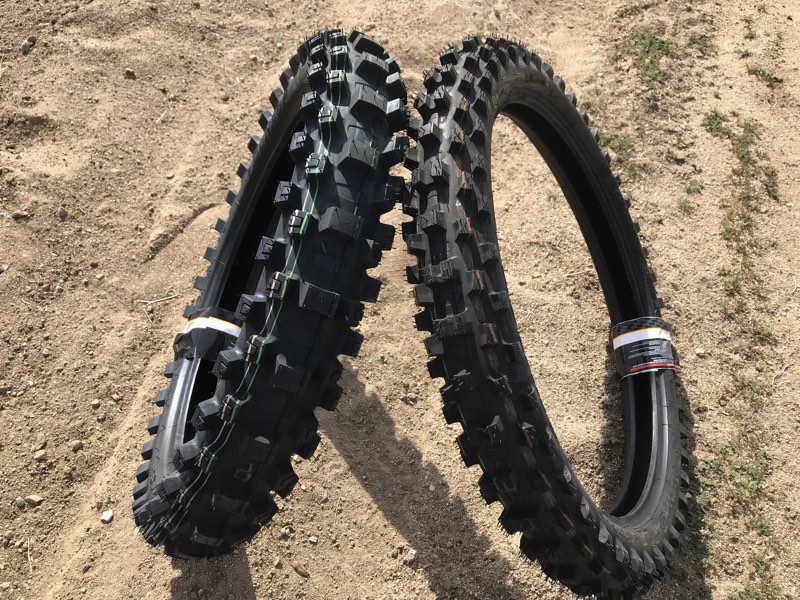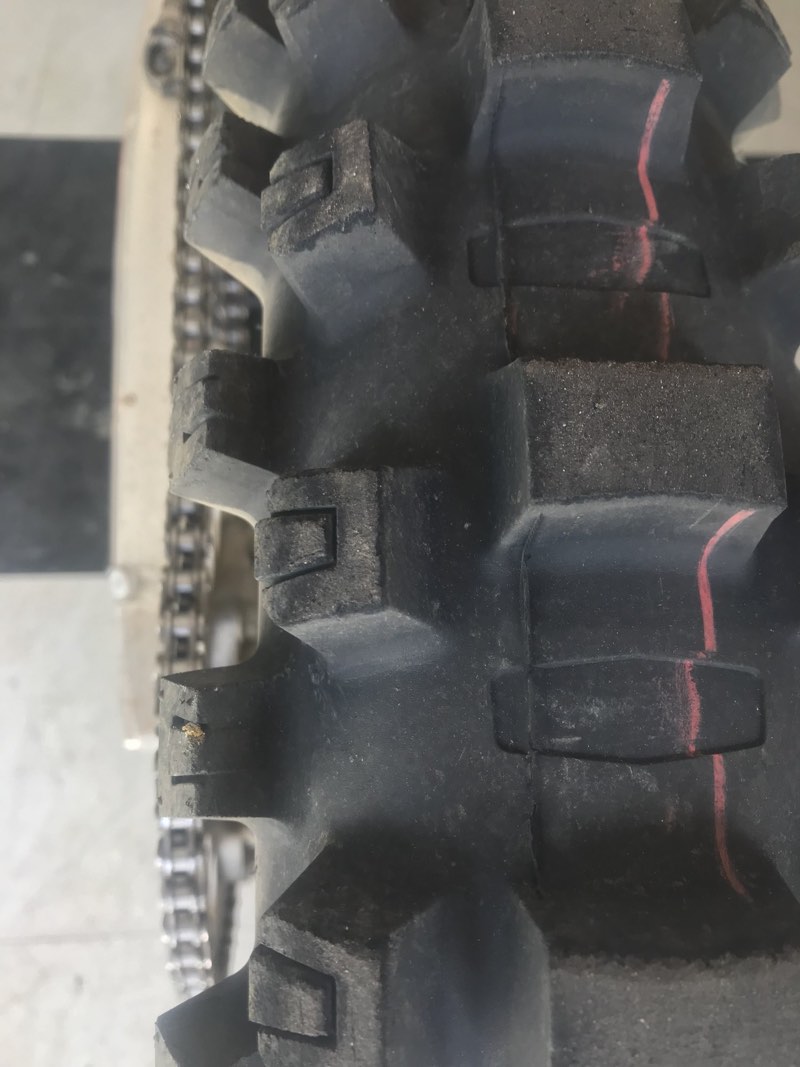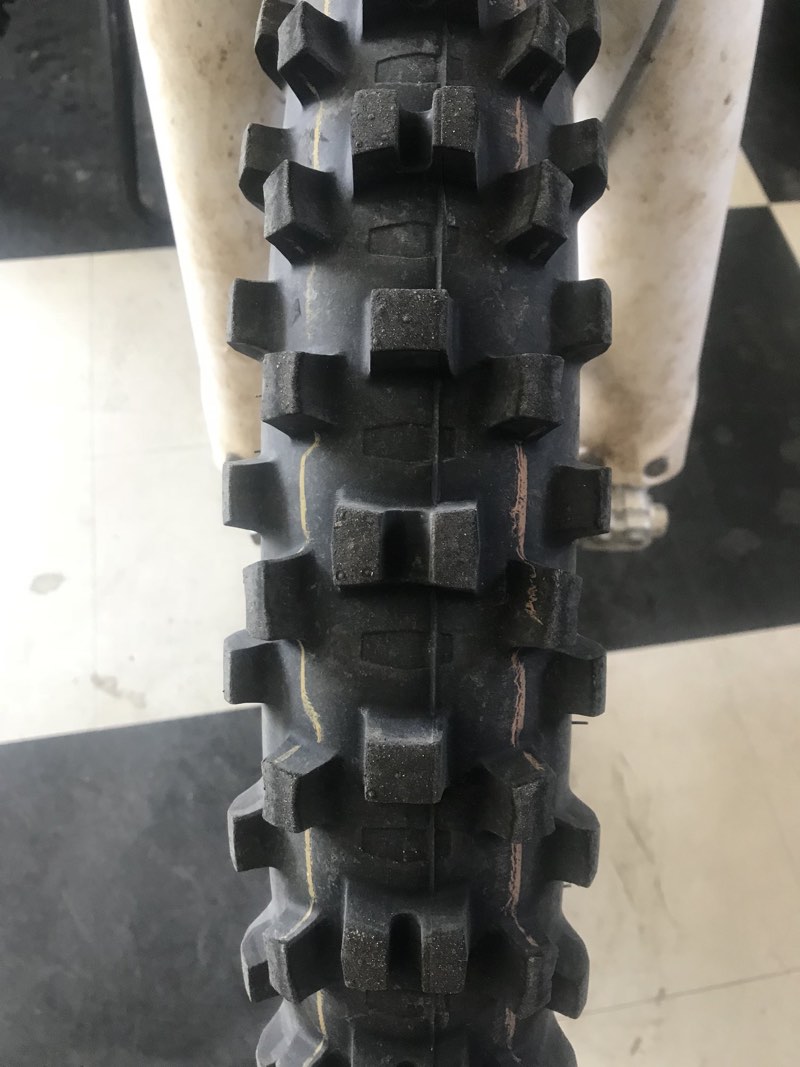Share This Article
The Dunlop Geomax MX3S tires have been around for a while now, but I still seem to get quite a few questions about these tires in my email inbox. The MX3S tire is the most popular off-road tire Dunlop offers, so I wanted to break down what I thought of the soft to intermediate terrain offering. There will be a new Dunlop MX33 tire that is coming later this summer, which means be on the look out for a full review right here on keeferinctesting.com in May.

The Dunlop Geomax MX3S Tires.
I found that the first thing that impressed me was that the Dunlop Geomax MX3S rear tire offers great forward bite (traction) in intermediate/soft terrain through ruts and coming out of corners. The “block within a block” side knob design works well under lean angle and traction is one of the MX3S rear tire strong suits, as the rider is able to get on the throttle sooner (while leaning) without washing out. You are also able to start your lean sooner (than most other brands of tires) coming into a corner and the MX3S remains planted to the ground. Braking predictability gives the rider confidence to pivot and throttle out of flat corners without much hesitation. Sometimes other rear tires can step out (or wash out) on you once you completed your braking and back on the throttle, but the MX3S lets you pivot/lean under throttle through flat corners nicely. The only complaint I had is that when the track surface was blue grooved, I could feel the side of the tire carcass roll when accelerating from flat corners. This gives the rider a pushing or loose feeling rear end. The key here is to run the correct air pressure at 13.5 psi for the Dunlop’s soft carcass. The soft nature of the MX3S carcass flexes and absorbs bigger type bumps and square edge (similar to suspension), which actually gives added comfort when the track turns rough. When you get a hard carcass feeling tire you will notice your machine will deflect and feel harsh on braking bumps and acceleration chop. Lowering your air pressure will sometimes help this sensation, but with the casing that Dunlop provides with their MX3S line, the bump absorption is superb. I do notice that when the tire gets half worn the performance goes away sooner than a Michelin Starcross 5 Medium or Bridgestone 404. The MX3S rear tire loses its “predictability” when worn on lean angle (coming into corners), which causes the rear end to wash out or slip under load. It is not uncommon for the side knobs to chunk off when worn down as well. I can usually get close to 10 engine hours on a MX3S rear tire on intermediate terrain. If you are using the MX3S rear tire on pure sand, the lifespan of the tire goes up exponentially. The Dunlop MX3S is a pure performance tire and is one of the best available for maximum traction when fresh.

Dunlop’s Block Within A Block Technology.
The MX3S directional front tire is great for front-end feel and lean angle traction, especially over the older MX31 and MX51 versions in all conditions. The MX3S front tire actually makes the steering feel “heavy” at times because the tire is at maximum grip under initial lean in corners. It can be somewhat grabby if you’re not used to it and can cause some oversteer, but once used to the lean angle feel the MX3S becomes magical in soft to loamy conditions. The MX3S is tailor made for a front wheel steering rider and can be leaned into corners earlier than most other tires very easily. The only other front tire that has as much, if not more front end lean angle traction is a Michelin Starcross 5 Soft. I did have a problem with the MX3S when the track had just been freshly watered and was slick on top (think of the second moto at a Glen Helen-type track). This would give the front end a vague feel (un-predictable) as the bike would have a tendency to push the front-end through flat corners (the MX52 is better in these types of conditions). The wear of the MX3S front tire is not as friendly in hard pack terrain as you can feel the side knobs roll on the hard pack surfaces. The vague/pushing sensation is common once on hard pack so you may want to stick with more of an intermediate to hard terrain tire if your local track has a hard base. Again, like the rear tire, the side knobs can chunk off rather quickly if you’re riding on intermediate terrain often. I typically get 10-12 hours on a MX3S front tire before I start to see chunking of the side knobs. This is a performance based tire and should be looked at accordingly.

Watch for chunking on the side knobs of the MX3S front tire.
“Hey Kris of course you’ll take the performance based tire because you don’t have to pay for them”. That is a statement I hear very often. My rebuttal is “No, I don’t always get tires for free so I spend my money on tires just like you”. Yes, tires are expensive, but I am more performance based than a durability based kind of tire guy. That means I accept the fact that I may get 10-12 engine hours on these tires before I have to go purchase another set. I understand that some of you reading this can’t do that. However, you have to consider riding conditions, how hard you ride and how often you ride. My 12 hour lifespan could mean 3-4 months of riding for you. Maybe longer?
Are you looking for performance or durability/lifespan from your motocross tires? You will have to decide for yourself on that because it is tough for a tire manufacturer to give you both at a very high level. I ride hard and often, so I am constantly pushing the knobbies of a tire. Dunlop has created a great tire, but saying it is the most durable tire on the market would be comical. However, I know what I am getting when I purchase a Dunlop MX3S and I like that it is a predictable tire for the conditions we have in Southern California. Will a Bridgestone 403/404 last longer? Yes, and it is a pretty damn good tire, but I get more lean angle traction with a Dunlop, so I choose to run a tire that I am able to push on. Look for a Keefer Tested podcast on tires very soon as we will break down performance and durability.
Notes:
Again…. Running 13.5 psi in the MX3S front and rear tires is crucial. As the soft carcass of the tire breaks down it tends to lead to pinch flats with 11-12 psi (even with heavy duty tubes). Not to mention the tires will roll on your rims more with 11-12 psi.
I tested and installed both of these types of tires on a 250F (80/100-21 and 100/90-19) and a 450F (80/100-21 front and 120/80-19). Installation of both sets of tires didn’t feel any different as any other older style Dunlop’s, but I will have to say that the Michelin Starcross 5 Soft tires are easier to put on.
The Geomax MX3S front tire is available in the aforementioned 80/100-21 size for $127.51. For 19-inch rear wheels, MSRP ranges from $134.04-$149.25.
